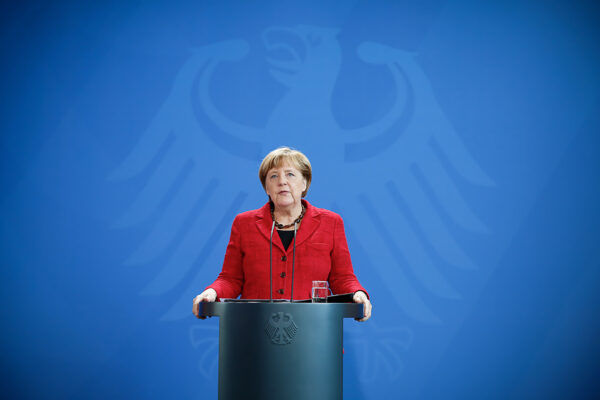
Angela Merkel stunned Germany’s allies this weekend when she suggested Europe could no longer rely on the United States.
“The times in which we can fully count on others are somewhat over, as I have experienced in the past few days,” she told supporters of her conservative party in Bavaria.
Merkel had just returned from NATO and G7 summits in Brussels and Italy.
She added: “All I can say is that we Europeans must really take our destiny into our own hands.”
Despite the qualifiers — “fully”, “somewhat” — the message was clear. Merkel even lumped the United Kingdom and the United States together with Russia among the countries that Europe must cooperate with “in a spirit of friendship.”
Uncontroversial at home
The remarks were uncontroversial in Germany, as one would expect. Merkel seldom gets ahead of public opinion.
If anything, the left would have wanted her to take a harder line.
Martin Schulz, the Social Democratic Party leader, blasted Donald Trump — whom he called “autocratic” — for trying to “humiliate” the Germans.
The new American president hectored his NATO allies at the dedication of a 9/11 memorial in Brussels for failing to meet the alliance’s 2-percent defense spending target.
He then broke ranks with other G7 leaders in refusing to endorse the club’s longstanding opposition to protectionism as well as its commitment to the Paris climate accord.
Permanent breach
Abroad, reviews of Merkel’s speech were mixed.
Some American thinkers, like David Frum, Richard Haass and Jacob Heilbrunn, accused Trump of jeopardizing transatlantic security by antagonizing the most powerful nation in Europe.
But Gideon Rachman felt Merkel acted irresponsibly too, writing in the Financial Times that her behavior could “widen a dangerous rift in the Atlantic alliance into a permanent breach.”
He does not excuse Trump and his assault on the institutions of the West, but argues it would be a mistake to allow his presidency to throw into doubt an alliance that has kept the peace in Europe for seventy years. The Republican may yet prove an aberration.
Rachman is similarly hopeful for Brexit and calls it “unfair” of Merkel to talk about his country like an extension of Trump’s America.
Theresa May did side with Canada, Europe and Japan in the climate discussions, he points out, not with the United States.
Her government has also been at pains to stress Britain’s commitment to NATO.
Denial
Either Rachman is in denial or we continentals are overreacting.
From here, Brexit and Trump’s election look like two sides of the same coin — and together they are a watershed moment for the West.
Brexit feels like the victory of Little England over Global Britain. How could this not affect the Atlantic alliance? Even Rachman admits that EU and NATO relations cannot be separated. His country cannot be bloody difficult in one corner of Brussels and reliable in another. If May continues to push for a “hard” Brexit that would see the United Kingdom sever all ties with Europe, there is bound to be collateral damage to NATO.
Trump has confirmed all of Europe’s worst suspicions about the United States. It may be unfair to blame the whole country, especially when a majority didn’t vote for him. But Europeans have long suspected that what Trump represents — a self-obsession, simplemindedness, xenophobia, militarism and disinterest in the rest of the world — lurked beneath the internationalist veneer of the American elite.
Even when Trump is removed, prematurely or in four years’ time, the forces that put him in power will not go away.
Prudent
If this analysis is correct, then it is prudent of Merkel to shake up pacifist German voters as well as European neighbors who have for years been complacent about their security.
The Economist argues that is precisely what she tried to do.
In her own country, left-wing parties are campaigning against raising defense spending to 2 percent of GDP, arguing for investments in education instead.
Elsewhere in Europe, governments are slow to restore defense budgets after years of cutbacks. Countries could also do far more to integrate their armed forces.
Germany never likes to wag its finger at other EU countries, The Economist writes, at least not in public. “Where possible it prefers to nudge the rest of the EU by tweaking its own public and diplomatic orthodoxies.” That is what Merkel did this weekend.
